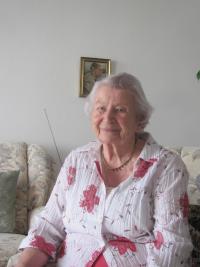I have spent my life in the Seliger Community

Stáhnout obrázek
Olga Sippl, née Stohwasser, was born on September 19, 1920, in Altrohlau near Karlovy Vary. She comes from a social-democratic, working-class family and already as a child, she grew up in the children and youth organizations of the Sudeten-German labor movement such as the Hawks, the Socialist Youth and the gymnastics and sports clubs. Here she experienced the solidarity with the Czech Social Democrats. Her father was a janitor at the elementary and town school and her parents were active as politicians in culture. Sippl attended the German-speaking girls‘ elementary school and for half a year also the Czech-language town school. After graduating, she took up a job in the Karlovy Vary Urania, working in its Prague office since 1938. After the Munich Agreement, her parents fled Altrohlau, which was annexed to the German Reich, and moved to Prague. However, Sippl could not follow her parents in the emigration to England because she was not present in the Sudetenland at the time of the annexation. Shortly before the occupation of Prague by the German Wehrmacht, she went with her boyfriend and later husband Ernst Sippl to Altrohlau. There they married. However, her husband was conscripted to the Wehrmacht and fell in March 1945. In 1943, their son Herbert was born. After the war, Sippl worked in the Antifa office in Karlovy Vary that organized the emigration of the Sudeten Germans recognized as anti-fascists. She herself, her son and her parents left Czechoslovakia with the last Antifa transport. After living in a refugee camp, in Königsdorf and with her parents in Birmingham, England, she was finally employed by the Bavarian SPD in Munich in 1949. In 1951, she co-founded the Seliger Community and was on the editorial board of the publishing house “The Bridge”. She was also a member of the Federal Board of the Seliger Community, a representative of the Seliger Community in the refugee advisory board of the SPD and was later appointed honorary chairman.
